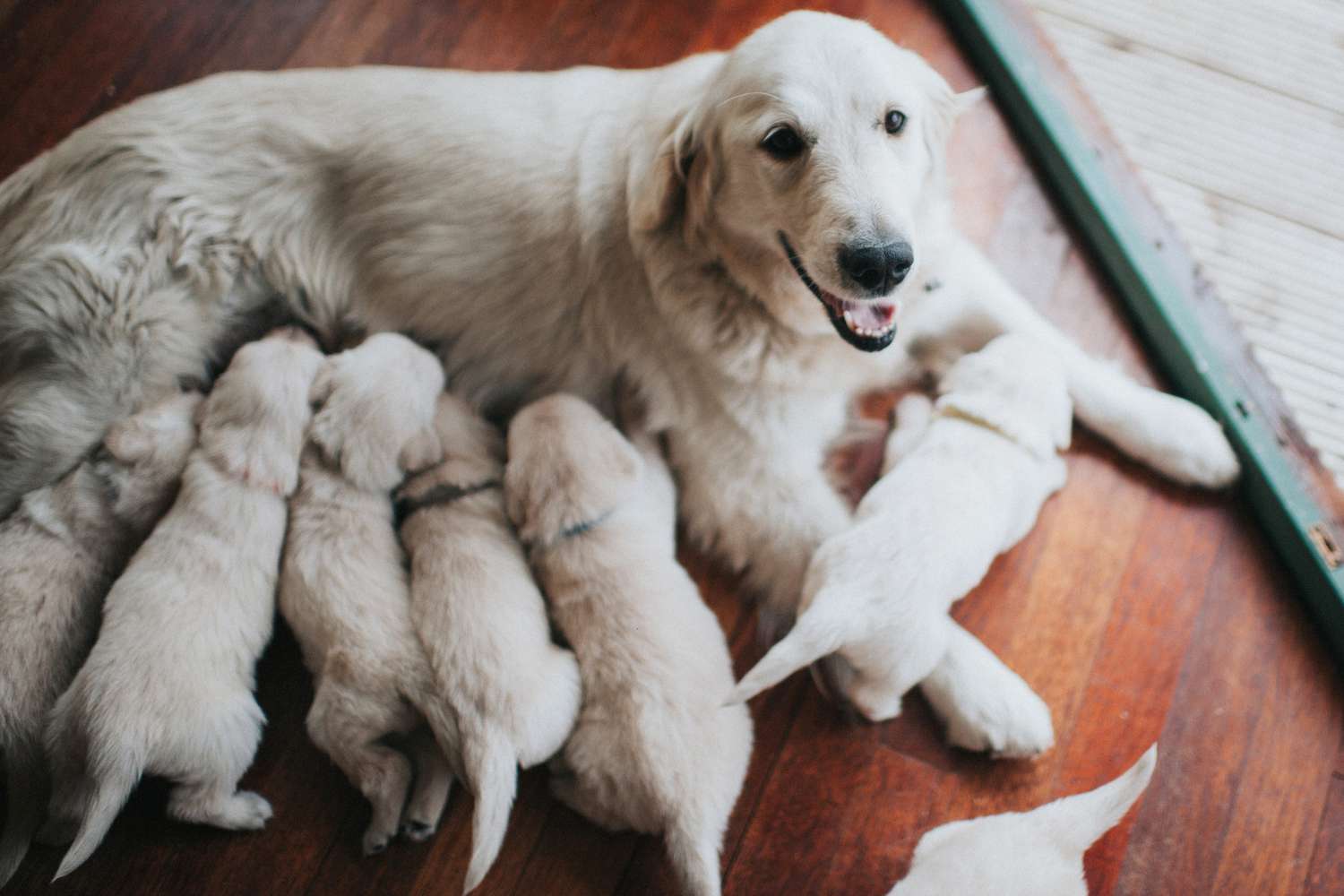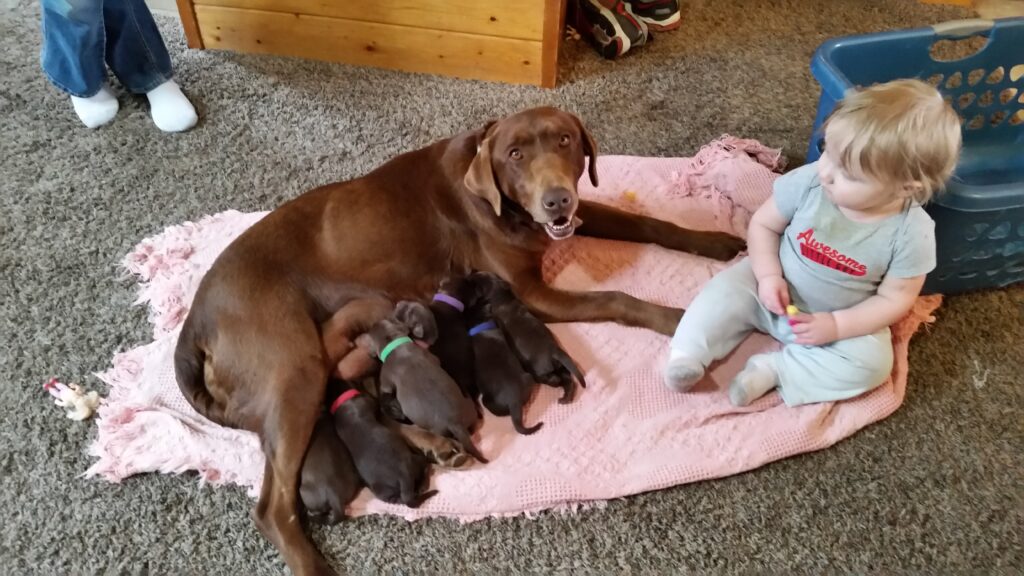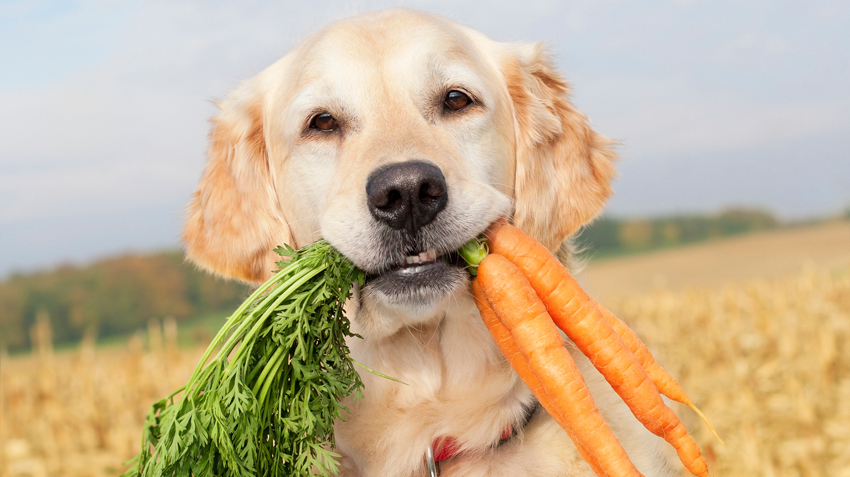The general rule is that the bigger the dog breed, the bigger the litter size. This isn’t always true, but there are several factors that can affect the size of a litter.
-
- Genetics are the number one factor. If the parents and grandparents had large litters, then there is a good chance your dog will have a large litter also.
- Nutrition is extremely important and will affect not only the size, but also the health of the puppies and dam. Seek out good nutrition with no corn or empty fillers if possible. While pregnant, a dam will need extra nutrition and feeding her a puppy chow is a good idea during this time.
- Age of both the dam and the sire will affect litter size. If the dam or the sire is either very young or getting very old, the litter size may be smaller. Dogs under 18 months are too young and over 6 years are too old to be mating.
- Weight will also affect litter size. If a dam or sire is overweight, mating will not be as successful and result in a small litter.
 Once a dam starts having puppies, take note of the litter size. Generally, a dam will have a pattern of how many puppies you can expect in a litter. If her first two litters had 6 or 7 puppies, then she will most likely continue to have 6 or 7 puppies in all her litters.
Once a dam starts having puppies, take note of the litter size. Generally, a dam will have a pattern of how many puppies you can expect in a litter. If her first two litters had 6 or 7 puppies, then she will most likely continue to have 6 or 7 puppies in all her litters.
Breeding responsibly can result in several costs. A small litter may result in little or no profit, so knowing what to expect is important. However, a large litter having a larger litter doesn’t necessarily mean there won’t be additional costs involved, especially if complications arise during labor. Be aware of which dog breeds have more difficulty whelping and what to do if you encounter complications. Knowing the size to expect is just one step in breeding dogs.
Here are some average litter sizes for different dog breeds:
- Basset Hound: 6-8 puppies
- Beagle: 6 puppies
- Bernese Mountain Dog: 5-7 puppies
- Boston Terrier: 3-4 puppies
- British Bulldog: 4 puppies
- Chihuahua: 3 puppies
- Corgi: 6-8 puppies
- Dachshund: 3 puppies
- English Bulldog: 4 puppies
- French Bulldog: 2-4 puppies
- German Shepherd Dog: 8 puppies
- German Shorthaired Pointer: 8-12 puppies
- Golden Retriever: 8-12 puppies
- Great Dane: 8-10 puppies
- Husky:4-6 puppies
- Labrador: 8-10 puppies
- Miniature Schnauzer: 6 puppies
- Poodle: 7 puppies
- Pug: 4-6 puppies
- Rottweiler: 8-12 puppies
- Shih Tzu: 3-4 puppies
- Springer Spaniel: 4-6 puppies
- Yorkshire Terrier: 4 puppies
 The largest litter size on record was delivered by a Neapolitan Mastiff in 2004. She had a whooping 24 puppies in one litter! However, since mastiffs have difficulty whelping, all 24 of these puppies had to be delivered by C-section by a veterinarian. With such a large litter, more is required from the breeder to help feed and care for them. The possibility of low birth weight, still births, and the dam unable to feed them all increases. Many dog breeds do not need the extra help nor have complications in whelping, but it is important to be prepared and aware of what to expect.
The largest litter size on record was delivered by a Neapolitan Mastiff in 2004. She had a whooping 24 puppies in one litter! However, since mastiffs have difficulty whelping, all 24 of these puppies had to be delivered by C-section by a veterinarian. With such a large litter, more is required from the breeder to help feed and care for them. The possibility of low birth weight, still births, and the dam unable to feed them all increases. Many dog breeds do not need the extra help nor have complications in whelping, but it is important to be prepared and aware of what to expect.



